- Home
- Anne Bennett
Another Man's Child
Another Man's Child Read online
Copyright
Published by HarperCollinsPublishers Ltd
1 London Bridge Street
London, SE1 9GF
www.harpercollins.co.uk
A Paperback Original 2015
1
Copyright © Anne Bennett 2015
Cover layout design © HarperCollinsPublishers Ltd 2015
Cover photographs © Gordon Crabb (woman and baby); Birmingham Museum Trust (street scene)
Anne Bennett asserts the moral right to be identified as the author of this work.
Cottage photograph © Martin Logue
A catalogue copy of this book is available from the British Library.
This novel is entirely a work of fiction. The names, characters and incidents portrayed in it are the work of the author’s imagination. Any resemblance to actual persons, living or dead, events or localities is entirely coincidental.
All rights reserved under International and Pan-American Copyright Conventions. By payment of the required fees, you have been granted the non-exclusive, non-transferable right to access and read the text of this e-book on screen. No part of this text may be reproduced, transmitted, down-loaded, decompiled, reverse engineered, or stored in or introduced into any information storage and retrieval system, in any form or by any means, whether electronic or mechanical, now known or hereinafter invented, without the express written permission of HarperCollins.
Source ISBN: 9780007359271
Ebook Edition © November 2015 ISBN: 9780007383276
Version 2015-09-15
Dedication
I dedicate this book to my cousins, Martin Logue of Redditch in the West Midlands, and Michael Mulligan from Dublin, with all my love and best wishes.
Table of Contents
Cover
Title Page
Copyright
Dedication
Chapter One
Chapter Two
Chapter Three
Chapter Four
Chapter Five
Chapter Six
Chapter Seven
Chapter Eight
Chapter Nine
Chapter Ten
Chapter Eleven
Chapter Twelve
Chapter Thirteen
Chapter Fourteen
Chapter Fifteen
Chapter Sixteen
Chapter Seventeen
Chapter Eighteen
Chapter Nineteen
Chapter Twenty
Chapter Twenty-One
Chapter Twenty-Two
Acknowledgements
A Note From Anne
About the Author
Also by Anne Bennett
About the Publisher
ONE
It was Norah Mulligan walking alongside her sister, Celia, who noticed Andy McCadden first. It was the first Saturday in March and the first Fair Day of 1920 in Donegal Town.
It was a fine day, but March living up to its name of coming in like a lion, meant it was blustery and cold enough for the girls to be glad they were so warmly clad. They were still wearing winter-weight dresses, Celia’s in muted red colours and Norah’s muted blue, and they were long enough to reach the top of their boots so the thick black stockings could not be seen. Over that they were wearing Donegal tweed shawls, fastened by Celtic Tara brooches, and their navy bonnets matched the woollen gloves that encased their hands.
Celia knew Norah considered bonnets old fashioned and babyish but Celia was glad of hers that day and also liked the blue ribbons that tied so securely under her chin. ‘Anyway,’ she had reasoned with her sister when she had complained again that day as she got ready in their room. ‘You’d have to have a hat of some sort – and just listen to the strength of that wind. Any other type of hat you had today would be tugged from your head in no time and in all likelihood go bowling down the road, however many hatpins you had stuck in it. You running to retrieve it would cause great entertainment to the rest of the town and I doubt that would please you much either.’
Norah said nothing to that because she did agree with Celia that bonnets were the safest option that day, especially when riding in the cart with their father where the wind was even more fierce. Given a choice she wouldn’t have gone out at all, but stayed inside by the fireside; however, their mother, Peggy, had given them a list of things to buy as they were going in on the cart with their father who had some beef calves for sale. They did go in often on Saturdays because the Mulligans’ farm was just outside the town and Peggy always said her gallivanting days were over, so the girls each had a bulging shopping bag as they crossed the square – shaped like a diamond and always referred to as such – to the Abbey Hotel where they were meeting their father.
The beasts for sale were in pens filling the Diamond and the pungent smell rose in the air and the noise of them, the bleating and grunting and lowing and squawking of the hens, just added to the general racket, for the streets were thronged with people, the shops doing a roaring trade.
As usual on a Fair Day the pubs were open all day. Some might have their doors slightly ajar so the two girls might get a tantalising glimpse inside. That was all they would get though, a glimpse, and if any men were standing outside with their pints, they would chivvy them on, for respectable women didn’t frequent pubs and certainly not young ladies like Norah and Celia.
The cluster of gypsies was there too as they were every Fair Day, standing slightly apart from the townsfolk. They’d always held a fascination for Celia, the black-haired, swarthy-skinned men who often had a jaunty manner and in the main wore different clothes to most men of Celia’s acquaintance: light-coloured cotton shirts, moleskin waistcoats and some, mainly the younger ones, bright knotted handkerchiefs tied at their necks, and they were not above giving girls a broad wink as they passed. The women seemed far more dowdy in comparison, for they were usually dressed in black or grey or dark brown with a craggy shawl around their shoulders and more often than not there was a baby wrapped up in it, while skinny, scantily dressed, barefoot children scampered around them.
Suddenly, Norah gave her sister a poke in the ribs, taking her mind from the gypsies as she said, ‘Will you look at the set of him,’ and she jerked her head to the collection of people at the edge of the fair at the Hireling Stall who were in search of someone to take them to work on one of the farms or as servants in the house. As the Mulligans needed no outside help, Celia had never taken much notice of them and she cast her eyes over them now. There were, however, a few young men and she said, ‘Which one?’
Norah cast her eyes upwards. ‘Heavens, Celia,’ she cried. ‘Do you really need to ask? The blond-haired one of course, the one smiling over at us this very moment.’
‘I’m sure you’re wrong, Norah,’ Celia said. ‘It can’t be us.’
‘Celia, he’s looking this way and smiling so he must be smiling at someone or something,’ Norah retorted. ‘No one but an idiot would stand there with a wide grin on his face for no reason and I tell you he is the least idiotic man that I’ve seen in a long time. Quite a looker in fact.’
Celia stole a look at the man in question and did think he was most striking-looking and she took in the fact that he was tall, broad-shouldered and well-muscled and the sun was shining on his back, making it seem like he had a halo around his mop of very blond hair. She couldn’t see the colour of his eyes, but she did see that they were twinkling so much it was like light that had been lit inside him and she felt herself smiling back. She looked away quickly and felt a crimson flush flood over her face. She saw that Norah had noticed her blush and, to prevent her teasing, said sharply, ‘Mammy will wash your mouth out with carbolic if she hears you talking this way.’
‘Better not tell her then,’ Norah said impishly.
/>
‘I just might.’
‘No, you won’t,’ Norah said assuredly. ‘You’re no tell-tale.’
‘All right,’ Celia conceded. ‘You’re right, I’d never tell Mammy. But talking of men, I was wondering the other day about you wanting to go to America and all. Whatever are you going to do about Joseph O’Leary?’
‘What’s Joseph O’Leary to do with anything?’
‘You’re walking out with him.’
‘Hardly,’ Norah said. ‘We’ve just been out a few times.’
‘Huh, more than a few I’d say,’ Celia said. ‘But it doesn’t matter how long it’s been going on, in anyone’s book that constitutes walking out together.’
‘Well if you must know,’ Norah told her sister, ‘I’m using Joseph to practise on.’
‘Oh Norah, that’s a dreadful thing to do to someone,’ Celia cried, really shocked because she liked Joseph. He was a nice man and had an open honest face, a wide generous mouth and his fine head of wavy hair was as dark brown as his eyes, which were nearly always fastened on her sister.
Norah shrugged carelessly. ‘I had to know what it was like. I am preparing for when I go to America.’
‘Does he know your plans?’
‘Sort of,’ Norah said. ‘I mean, he knows I want to go.’
‘Does he know you’re really going, that Aunt Maria said she’ll sponsor you and pay your fare and everything?’
‘Well no,’ Norah admitted.
‘Poor Joseph,’ Celia said. ‘He’ll be heartbroken.’
‘Hearts don’t break that easy, Celia.’
‘Well I bet yours will if you can’t go to America after all and Mammy could stop you because she’s great friends with the O’Learys.’
‘Mammy will be able to do nothing,’ Norah said confidently. ‘She has made me wait until I’m twenty-one and that was bad enough, but I will be that in three months’ time and then I can please myself.’
‘She doesn’t want you to go.’
‘I know that and that was why she made me wait until I was twenty-one.’
‘And that doesn’t worry you?’
‘It would if I let it,’ Norah said. ‘Now you worry about everything and in fact you would worry yourself into an early grave if you had nothing to worry about. You never want to hurt people’s feelings either and, while it’s nice to be that way, it could stop you doing something you really want to do in case someone disapproves.’
‘Like you going to America?’
‘Exactly like that.’
‘But I’d never want to leave here,’ Celia said, looking around the town she loved so much. She loved everything, the rolling hills she could see from her bedroom window dotted with velvet-nosed cows calmly chewing the cud, or the sheep pulling relentlessly at the grass as if their lives depended upon it, and here and there squat cottages with plumes of grey smoke rising from the chimneys wafting in the air. Their farmhouse was no small cottage however for it was built of brick with a slate roof and unusually for Ireland then, it was two storeyed. Downstairs there was a well-fitted scullery with a tin bath hung on a hook behind the door and leading off it, a large kitchen with a range with a scrubbed wooden table beside it and an easy chair before the hearth. It was where the family spent most of their time, for though there was a separate sitting room it was seldom used. The stairs ran along the kitchen wall and upstairs were three sizeable bedrooms; her parents had their own room, another she shared with Norah and Ellie and the other one was for Tom, Dermot and Sammy.
It was all so dear to her, familiar and safe and she couldn’t see why anyone would want to leave it. She said this to Norah and added, ‘I’d never want to go away from here.’
‘Never is a long time,’ Norah said. ‘And you’re only seventeen. I felt like that at seventeen. But by the time I was twenty I felt as if I was suffocating with the sameness of every day.’
‘But don’t you want a husband and children?’
‘Not yet,’ Norah said emphatically. ‘Why would I? I intend to keep marriage and all it entails at bay or at least until I meet and fall madly in love with a tall and very handsome man, who has plenty of money and will adore me totally.’
Celia burst out laughing. ‘Shouldn’t say there’s many of them about.’
‘Not in Donegal certainly,’ Norah conceded. ‘But who knows what America holds? The country may be littered with them.’
Celia laughed. Oh, how she would miss her sister for, since leaving school, she saw her old friends rarely. She’d meet some of them occasionally in Donegal Town, but it wasn’t arranged or anything, they would just bump into one another. They seldom had time for any sort of lingering chats because all the girls would usually have a list of errands to do for their mothers. The only other time to meet was at Mass on Sunday but no one dawdled after that because most of the congregation had taken communion and so were ravenously hungry, for no one was allowed to eat or drink if they were taking communion. So the two sisters had relied on each other – and Peggy wasn’t the only one to hope that Norah would change her mind in the months till her twenty-first birthday.
Celia opened her mouth to say something to Norah about how much she would miss her, but there was no time because they had reached the Abbey Hotel and their father, Dan, was waiting on them. Celia thought her father a fairly handsome man for one of his age; his black curls had not a hint of grey and he had deep dark brown eyes just like her eldest brother, Tom. Only his nose let him down for it was slightly bulbous, but his mouth was a much better shape. Tom was just like a younger version of him. Dan was a jovial man too and as they approached his laugh rang out at something someone in the crowd had said and it was so infectious that Celia and Norah were smiling too as they reached him.
He had told them on the way in that if he sold the calves early enough, they could wait on and he’d take them home in the cart, but if the calves were not sold, he might stay on and they would have to make their own way home. Celia wondered why he even bothered saying that because she had never known her father come home early on a Fair Day and his delay had more to do with the pubs open all the day and old friends to chat to and gather news from than it had to do with selling the calves.
Norah knew that too, but both girls went on with the pretence. ‘Have you sold the calves, Daddy?’
Dan took a swig of Guinness from the pint glass he held before he said, ‘Might have. Man said he’d tell me this afternoon when his brother has a chance to look them over. So you must make your own way home. Tell your mother.’
‘Yes, Daddy,’ the girls chorused, though they knew their mother wouldn’t be the least bit surprised.
They passed the Hireling Stall again on their way out of town and Celia saw the blond-haired man talking to Dinny Fitzgerald whose farm abutted theirs in many places. ‘Looks like Dinny’s hiring that chap,’ Norah remarked.
‘Well Daddy said he would have to hire someone after his son upped and went to America,’ Celia said and added, ‘Huh, seems all the Irish farms are emptying of young men going to that brave New World.’
‘Yes and I might want to nab one of those men for myself in due course,’ Norah said. ‘That’s why I have to practise on poor Joseph.’ And her tinkling laugh rang out at the aghast look on Celia’s face.
It was some time later when Dan Mulligan came home, very loud and good-humoured, which Peggy said was the Guinness effect. He brought all the news from the town though, including the fact that Dinny Fitzgerald had indeed taken on a new farm hand.
‘Must be no sign of his son retuning then,’ remarked Peggy. ‘America seems a terrible lure to the young people.’
‘Aye,’ Dan said. ‘But sure it’s hard for a man when he has only the one son who will inherit the farm and who has so little interest in it he is away to pastures new, and so Dinny has to have strangers in to work it with him.’
‘Maybe the lad didn’t take to the life,’ Norah said. ‘You know, maybe he doesn’t want to be a farmer.’
‘Take to the life,’ Dan said with scorn. ‘What’s whether he likes it or not got to do with anything? People can’t always do as they please and in this case there is no one else and it’s his birthright. Is he not going to come back and take it on board after Dinny’s day, let the farm fall to strangers and after it being in the family generations? Tell you, I’d find that hard to take.’
‘Well not every man has the rake of sons you have,’ Peggy said. ‘So if our Tom here didn’t want it, then Dermot might or even wee Sammy, for all he’s only seven now. Or Jim might come back from America and take it on if there was no one else. Mulligans will farm here for some time to come I think.’
Celia, listening as she washed the dishes in the scullery, knew her mother was right. She knew too most farmers wanted more than one son but the eldest inherited everything and the others had to make their own way. That’s what Jim had said when he left for America’s shores. It had been five years ago when he had decided. He had been twenty-three then, two years younger than Tom and, knowing his future was in his own hands, he had written to Aunt Maria who had sailed away to New York many years before with her new American husband and was quite a wealthy woman now, but a childless one. She had been delighted to hear from Jim, and agreed to not only sponsor him but also pay his fare and said she would do the same for all who wanted to follow their brother.
Peggy hadn’t liked to hear that bit and she watched the restless Norah growing up rather anxiously and was glad and relieved when she settled with Joseph O’Leary, but not as settled as she might be, because just a few months before she had claimed it wasn’t serious between them. There was no understanding, Norah had said and it was just as well because she wanted to follow Jim to America.
‘If you throw Joseph over you’ll get your name up, girl,’ Mammy had said at the time.

 As Time Goes By
As Time Goes By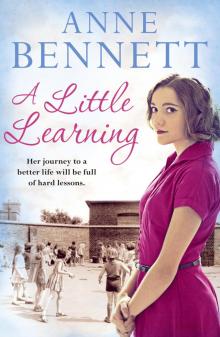 A Little Learning
A Little Learning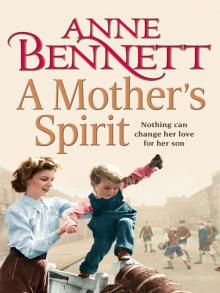 A Mother's Spirit
A Mother's Spirit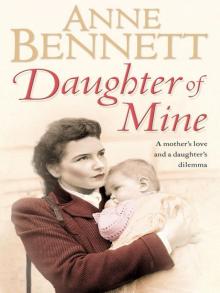 Daughter of Mine
Daughter of Mine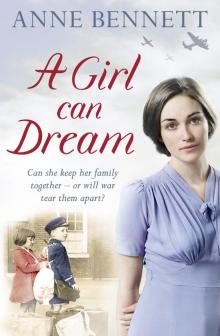 A Girl Can Dream
A Girl Can Dream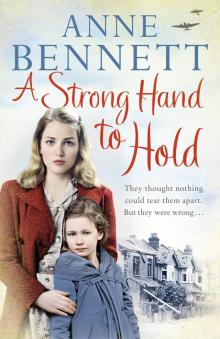 A Strong Hand to Hold
A Strong Hand to Hold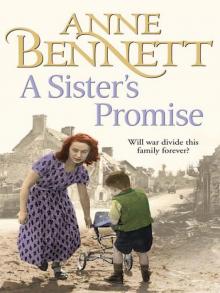 A Sister's Promise
A Sister's Promise To Have and to Hold
To Have and to Hold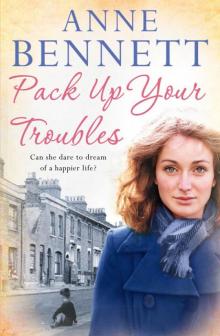 Pack Up Your Troubles
Pack Up Your Troubles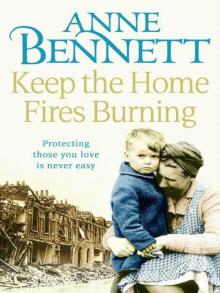 Keep the Home Fires Burning
Keep the Home Fires Burning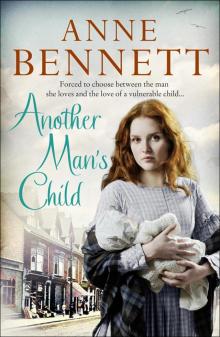 Another Man's Child
Another Man's Child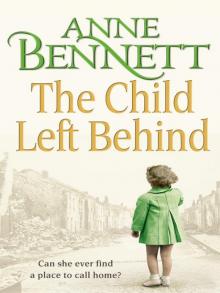 The Child Left Behind
The Child Left Behind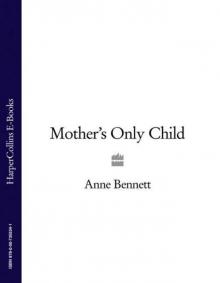 Mother’s Only Child
Mother’s Only Child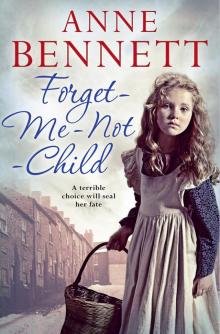 Forget-Me-Not Child
Forget-Me-Not Child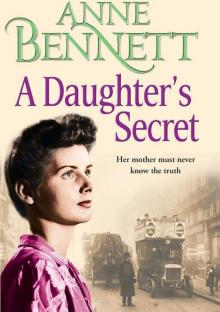 A Daughter's Secret
A Daughter's Secret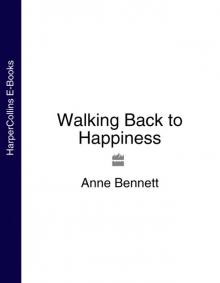 Walking Back to Happiness
Walking Back to Happiness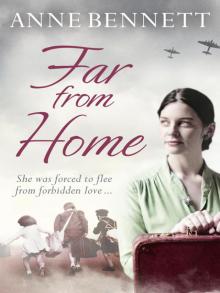 Far From Home
Far From Home Till the Sun Shines Through
Till the Sun Shines Through